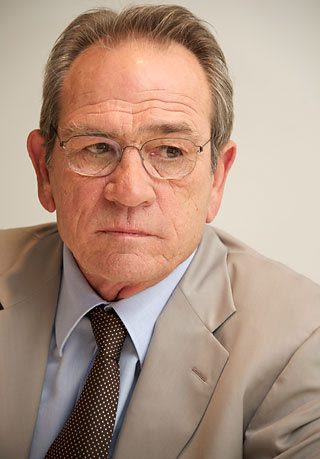
Tommy Lee Jones (Photo: Vera Anderson/WireImage/Getty)It's
a cloud-covered Southern California afternoon, and at the historic,
salmon-colored Beverly Hills Hotel, a dapper Tommy Lee Jones, dressed in
an impeccable grey suit, awaits his interview with Yahoo! Movies while
tucked behind a half-moon-shaped booth in the hotel's pristine Polo
Lounge.
Unlike other actors, Jones' presence is felt yards away. It's both
surreal and daunting -- especially since the 66-year-old, six-foot-tall
Oscar winner has a reputation for being less than forthcoming with the
press. (Read "An illustration of the tight-lipped Mr. Jones.") This day is no different.Jones makes no qualms, curtly avoiding questions he doesn't want to answer with short "No"s and dismissals. Still, he opens up about his character in "Lincoln" -- radical Republican House leader Thaddeus Stevens, saying, "We have to realize that he's looking at the world from the eyes of a person who's been physically impaired since birth." (Stevens was born with a club foot.) Jones also speaks freely about working with Sally Field (again) and Daniel Day-Lewis, calling both of them "fine actors."
Like Day-Lewis and Field, Jones is getting Oscar buzz for his "Lincoln" role. But when asked what he thinks about the early scuttlebutt, Jones simply says, "I don't have any thoughts on that subject."
 Jones as Thaddeus Stevens in 'Lincoln' (Photo: DreamWorks Pictures)Jones
is more comfortable detailing his character -- a Civil War-era
congressman who was pivotal in getting the 13th amendment passed that
abolished slavery in the U.S. What provided the most insight into
Stevens was "that he was born to a family of farmers. Because of his
club foot he could not work in the fields with his brothers and his
father, therefore, didn't have any access to activities that would build
self-esteem for a kid," Jones explains.
Jones as Thaddeus Stevens in 'Lincoln' (Photo: DreamWorks Pictures)Jones
is more comfortable detailing his character -- a Civil War-era
congressman who was pivotal in getting the 13th amendment passed that
abolished slavery in the U.S. What provided the most insight into
Stevens was "that he was born to a family of farmers. Because of his
club foot he could not work in the fields with his brothers and his
father, therefore, didn't have any access to activities that would build
self-esteem for a kid," Jones explains.Growing up destitute and fatherless (Stevens' father vanished when he was a young boy), Thaddeus Stevens overcame the odds by getting into Dartmouth and eventually becoming a successful lawyer, and then a congressman. "I was impressed with his mother because she exposed him very early on to books and made that his life, and he responded very well and developed a very keen mind," Jones points out. "And when he went west to Pennsylvania, he was an immediate success as a lawyer and a businessman. So that impressed me."
Jones is supremely reluctant to draw connections between himself and Stevens. But there are marked similarities: Both grew up without very much money, both got into ivy league schools (Jones went to Harvard), and both experienced tremendous success in their respective careers -- which Jones is still experiencing.
The actor hit the books to research his role. There are three biographies on Thaddeus Stevens, according to Jones, and only "two of them were worth reading." One that was written in the '30s and the other from the '80s -- both of which Jones reports reading thoroughly in order to compare historian perspectives. "That was all very informative as you begin to decide how to behave, what to think, and what to feel in the service of [Tony] Kushner's screenplay and Steven [Spielberg's] movie."
Jones' level of comfort in knowing Stevens is apparent when he compares the Civil War-era congressman to Richard III -- who has been described as having a hunched back, likely the result of scoliosis. "Richard and Thaddeus Stevens are radically different characters, but they're both looking at the world from a crippled body, and it has an effect."
A far cry from "Lincoln," Field and Jones starred together in the 1981 comedy "Back Roads." Without acknowledging the film outright, Jones says he has kept in touch with Field over the years adding, "We're friends. I love having friends who are fine actors. I feel pretty lucky about that."
source internet....
0 comments:
Post a Comment